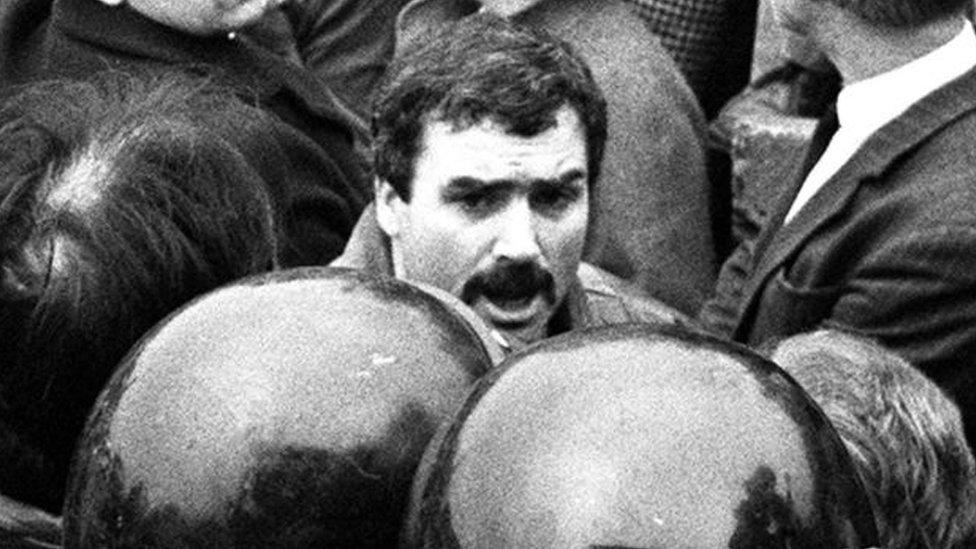Stakeknife: Prosecutors decide not to charge final 12 people
- Published

Fred Scappaticci denied he was an Army agent within the IRA
The Public Prosecution Service (PPS) has issued the last decisions in the agent Stakeknife case and the result is no-one will face court following a multi-million-pound investigation.
The final deliberations involved five retired soldiers and seven alleged IRA members.
They related to three murders and two abduction cases between 1987 and 1994.
The PPS said there was "no reasonable prospect of conviction" in respect of any of the 12 individuals.
Stakeknife was an IRA member who became one of the UK's most valuable spies during the Troubles.
Run by the Army's Force Research Unit (FRU), he is widely believed to have been Freddie Scappaticci who died in 2023.
The agent's actions formed a major part of a six-year legacy investigation known as Operation Kenova.
It has cost about £40m.
It began in 2016 under Jon Boutcher, who stepped down from the role on becoming chief constable of the Police Service of Northern Ireland (PSNI) last year.
At the time Mr Boutcher had stated he was determined to get people before the courts.
In all, the PPS has been assessing 28 files of complex evidence relating to Stakeknife.
It began issuing decisions in 2020, but the majority have been made in the past three months.
Every decision reached was not to prosecute.
In the latest cases, the five retired soldiers worked within FRU - three of them were agent handlers and two held more senior positions.
They were reported for the offence of misconduct in public office.
'Disappointed but unsurprised'
One of the last batch of cases involved the murder of Caroline Moreland, a 34-year-old Catholic woman, who was tortured and killed by the IRA in 1994 on suspicion of being an informer.
Her family's solicitor, Kevin Winters, said they were "disappointed but unsurprised" by the decisions not to bring prosecutions.
He said he has asked the PPS to review its decision.
"As part of that request and consistent with a similar representation made in another Kenova case, we will ask the PPS to engage on the issue of corporate criminal liability by the security forces," Mr Winters added.
New forensic findings
The head of Operation Kenova, Sir Iain Livingstone, expressed his "frustration" that the case that had been built "will now not be tested before a court".
"We have recovered a huge amount of new material and made significant forensic breakthroughs," he said.
"That includes obtaining new physical evidence and repurposing existing exhibits to obtain full DNA profiles on suspects more than 40 years after they were originally recovered. We have also been able to utilise cutting-edge techniques of fingerprint and DNA recovery on ballistic items to present significant evidence linking numerous murder cases forensically for the first time," he added.
He thanked victims for their "bravery and fortitude".
"Many have shared new and significant evidence to strengthen our investigation including physical evidence never previously shared and eye-witness accounts to help us piece together abduction and murder cases and identify those who inflicted serious injury and torment," he added.
Director of Public Prosecutions Stephen Herron accepted there will be "deep disappointment" among victims' families over decisions not to prosecute anyone in relation to Stakeknife.
He added: "The value of the investigation should not be measured solely in terms of any prosecution decision outcome.
"I am mindful that an interim Operation Kenova report is to be published next week and is to be followed by individual reports to families who suffered a bereavement.
"I hope that these reports will demonstrate the wider value of Operation Kenova investigations in providing answers to families and also setting out a fuller context and narrative on what are no doubt very challenging and significant issues of understandable public interest".
Related topics
- Published6 December 2023

- Published11 April 2023
